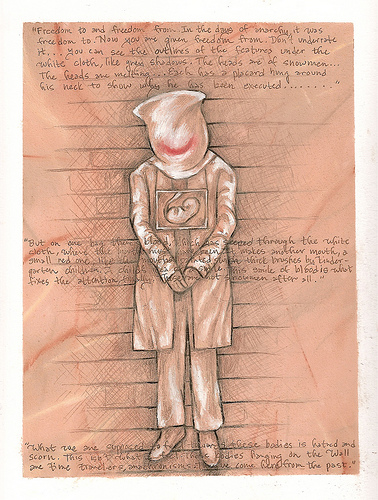Disrespectfully meeting the gaze
I seem to be on a bit of a tear here (just imagine what my classes must have been like before I had a blog-deposit for all my associated thoughts…!)
Anyhow, this one is about the symposium on Gender, Equity and the Middle East which took place @ BMC this afternoon and evening. I had to miss most of the presentations in order to teach my other class (sigh…), so am hoping that someone else (Hannah, I saw you there!) might report in (@ least!?) on the one entitled “Is Male to Female as Mind is to Body?” I caught Deborah Harrold’s talk about “The Exotic Other,” and the Q&A time w/ all the presenters, as well as the documentary film directed by Wazhmah Osman and Kelley Dolak, Postcards from Tora Bora, a very powerful-and to me dislocating–account of Wazhmah’s return to Afghanistan, 20-some years after she emigrated to the U.S. with (part of) her family.
Several things that Deborah said seemed to pick up and develop the themes from our last panel (which we realized, retrospectively, as being about the gender segregation of professional work). Deborah said, for instance, that gender identities are affected by economics: “gender performances are determined by what spaces people can gain access to, economically speaking” (as one woman said, “At home I have to be a woman; @ work I have to be a man”).
The discussion during Q&A also anticipated some of the conversation we’re going to have, after break, about the representation of gender and technology. It was said, for instance, that “image technologies are never disinterested in how they organize the narrative”–meaning, for example, that an image (such as this famous one),

which is so profoundly decontextualized (both the young woman and her older self are presented with “her social group removed”), is structured so as to allow the viewers’ associations to fill in the gaps. I also heard that there are “particular Western ways of gazing (in Islamic cultures, it is thought to be disrespectful to “meet the gaze,” while lowering it is seen as respectful; that–although veiling has negative connotations in the West–“it has been very powerful for some women”; and that “the segregation of the sexes can offer also moments of liberation.”
Context, perspective and p.o.v. are of course central in all such readings…
Comments are closed.


The first talk by Farha Ghannam of Swat was really interesting; she talked about problems with the ways that we in the West portray Middle Eastern women and don’t portray Middle Eastern men. Women in general are associated with the body and private life, and men with the mind and public life. This way of characterizing has lead to the West’s portrayal of Middle Eastren women as voiceless victims and men as bodiless oppressors/terrorists. Farha said that when we talk about “Gender and the Middle East,” usually we only mean women (she showed a poster for an upcoming conference on the topic at Sarah Lawerence that had photos only of women, mostly with their faces covered). This reminded me of our panel last Monday when we had a row of pure F’s for female up the on board for who we were representing.
Her point was that men are just as preoccupied as women are by how they present their bodies, and they have to be in order to avoid harrassment by police on the street and to get and keep their jobs. Men are supposed to be visible in the public sphere while women are supposed to be invisible, so it makes sense that they would have to work hard to present their bodies well. Farha ended by saying that if we think of Middle Eastern men as bodiless and not subject to societal pressures–basically if they are presented as inhuman–then it will continue to be OK for people to only really care about conflicts where “women and children” were involved. And, I think, we will continue to fear the nebulous threat of the evasive “terrorists”.
This resonated with me re: this class, because we do need to talk more about the guys; I think some men feel just as oppressed as women do by having to perform their gender in a society that constantly judges them. The problem is that it’s so much easier to find texts, examples, etc. about how women are oppressed by gender roles. Where can we look for opinions about gender from men?
Don’t know how to format a link within a comment, but this photo from the NY Times front page today: http://www.nytimes.com/2009/03/03/world/asia/03shelter.html?ref=todayspaper
is a perfect example of the photos Wazhmah Osman was talking about: a Middle-Eastern woman with her face covered, isolated from her family group, although the first paragraph and most of the article talks about her abusive husband and family.
I was trying to think if I’ve ever seen Middle Eastern women photographed in another way, and I have: in pictures from the Central Asia Institute (ikat.org) founded by Greg Mortensen (who I got to meet a few years ago!). They have lots of photos of women working together from their work building schools for girls in Pakistan.
You can put tags in your comments by using a simple html code. See the newest entry @ Tech Tips for instructions on how to do this.